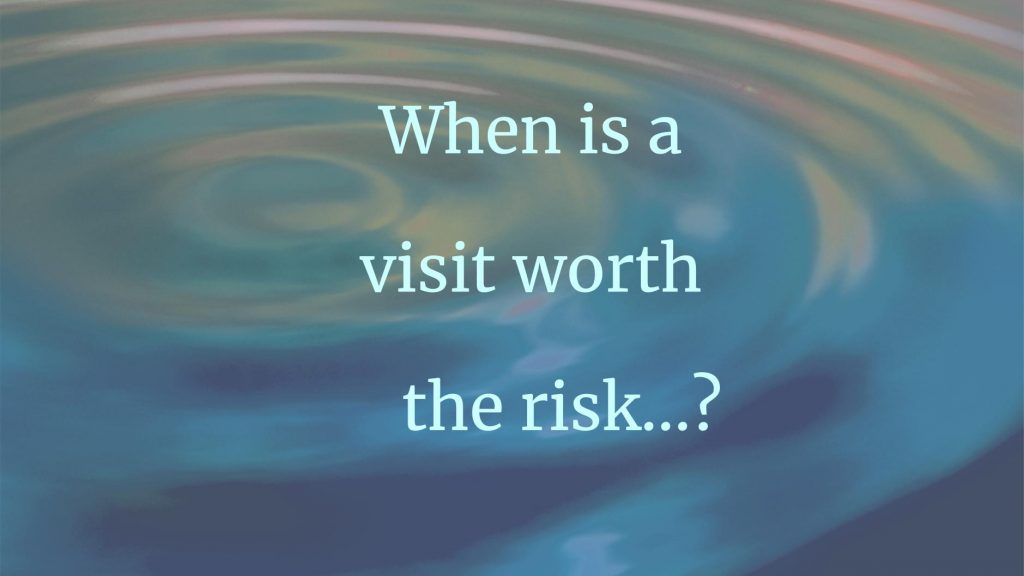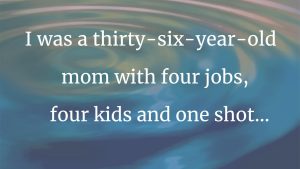Before stepping into Jasmin’s room, I slathered my hands with cold Purell and began the mundane ritual of donning my PPE. The smell of alcohol filled my nostrils as I grabbed a gown and the paper bag containing my N-95 mask and face shield. Like a seasoned soldier preparing for battle, I put on my gear with ease. With my gloves glued to my skin by sanitizer, I rapped on Jasmin’s door, asking permission to enter.
As I walked in, my ears were battered by the oximeter’s constant beeping, a signal that Jasmin’s oxygen levels were too low. Although she’d been positioned belly down to maximize her lungs’ ability to function, they were still hungry for air. Sunlight flooded through the windows, but she clearly couldn’t enjoy it or focus on anything but the struggle to get enough oxygen.
Sweat dripped down my back; I felt unsure if it was from nerves, or from the gown overheating me. After an exchange of introductions, Jasmin, gasping between breaths, told me her story.
A few months back, before the pandemic was in full swing, her best friend in the whole world had moved to Miami.
“I had planned to visit her there, but because of coronavirus, I initially decided against it,” she said. “I know COVID-19 can kill people.” A seasoned clinical social worker counseling patients with mental-health issues, she’d seen the daily news images: Black bodies sick and dying from police brutality and from COVID-19–and, at the root of it all, systemic racism. She was determined not to become another Black body, another statistic.
But she also saw COVID-19’s detrimental effects on mental health. She saw it in her patients–already anxious, stressed and depressed, and now bearing the weight of a global pandemic. And she saw it in her best friend, Madison–lonely in a new city, sheltering in place, making no new connections. They missed each other dearly, and video calls could only do so much.
Should I visit her in Miami? she wondered.
She knew the dangers, but her head and her heart were at odds. Her husband implored her not to go, but eventually she decided to visit her best friend. She took every possible precaution: The entire time that she was at the airport and on board the plane, she socially distanced, sanitized the seats and wore a surgical mask. But when she saw Madison in person for the first time in months, they couldn’t help but embrace. Yearning for some sense of normalcy, they hung out together at the pool without masks, then went out to brunch at a restaurant with an outdoor patio. It felt like pre-pandemic times again.
Now, she said, “It was the worst mistake of my life.”
Two weeks after returning home, she developed fevers and had trouble breathing. She tested positive for SARS-CoV-2. An immense fatigue began to overwhelm her body. She was admitted to the hospital, with oxygen requirements that, within hours, escalated from 3 liters/min to 5 liters/min to 10 liters/min.
If this keeps up, I worried, she might need to go to the intensive-care unit for life-sustaining care before evening.
I set up a video call with her husband, Dan. The three of us discussed how Jasmin might have caught the virus. Was it at the swimming pool or the outdoor brunch? Perhaps it was at the airport, or on the plane ride home? Madison had tested negative, and so had Jasmin’s other close contacts, including Dan.
“How does the virus cause shortness of breath?” Jasmin asked me. “Is it damaging the cells in my lungs?” I answered her questions to the best of my ability. Dan’s brow furrowed as I conveyed my worry that she might need to go to the ICU.
Jasmin expressed searing regret about visiting Miami. “If only I hadn’t gone on that trip, this wouldn’t have happened,” she chastised herself. “I’m such a selfish person!”
Hearing her, I couldn’t help but say, “Please be kind to yourself!” I’ve seen countless patients, friends and colleagues wrestle with these same questions: Is it safe to drive or fly across the country to see my family? If I do, should we wear masks and stay six feet apart the whole time? Is the emotional benefit worth the physical risk?
All the while, I felt acutely aware of the parallels in Jasmin’s and my experiences during the pandemic. She, a Black woman, experiencing anti-Blackness on a daily basis, shamed by others and by herself for fulfilling a human need, and scared of COVID-19, which is disproportionately killing Black Americans. I, an Asian American immigrant, am reminded of my conditional acceptance by White Americans as I see anti-Asian hate crimes spike during the pandemic.
I placed my gloved hand on Jasmin’s ungloved hand, trying my best to break through the sterility of our interaction and convey some human warmth through touch.
Humans are innately social creatures. We crave love, touch and physical connection. Ironically, by following the medical experts’ recommendations on how to maintain our physical health, we’ve ended up putting our mental health at risk.
How do you balance the need to physically distance with the need for emotional closeness? Everyone’s answer is a little bit different.
In order to minimize the risk of contracting and spreading the virus, my family and I decided that I should forgo a visit back home to California until a majority of the nation has been vaccinated. Until then, I’m hoping that we can maintain our connection via video calls. On the other hand, some of my colleagues have been willing to fly cross-country to visit their family and friends. Even physicians have trouble calculating the risk-benefit ratio, when their own families are part of the equation. When will we be able to embrace each other again without guilt?
A few hours after our encounter, Jasmin’s symptoms worsened, and she was transferred to the ICU for increased oxygen support and closer monitoring. Although I was no longer responsible for her care, I felt scared for her and checked her medical chart occasionally throughout her stay.
To my intense relief, a few days later her breathing improved, and she was discharged back home and into the arms of her husband. The worst mistake of her life was over.
I don’t know if she still blames herself for what happened, but I hope that she can find comfort in knowing that we’re all struggling to strike the right balance between protecting our health and preserving our humanity.
In my eyes, Jasmin did not do something wrong; she did something human.









8 thoughts on ““The Worst Mistake of My Life””
I so agree with your assessment. These decisions are painful for all. If only we could have a crystal ball before making such decisions. Thank you for writing. Particularly for my elderly black and brown patients who live in one room inner-city apartments and are home without much to do 24/7, I so understand how tempting the risk is to see family. Racial equity is definitely part of all of this.
Jasmin’s thoughts and deliberations are unfortunately so easy to relate to. During COVID-19 time we are constantly -unconsciously- weighing risks. What are the consequences if I do A, versus what are the consequences when I do ?
The consequences (the outcomes of the risks we take) are often serious for me and for others: will I get infected, will I infect others, will I be a risk for others? Imagining the consequences may also lead to possible feelings of guilt:
If I infect others, how will I feel about it?
If I get infected while I could have prevented this, how will I feel about this in relation to myself and how will I feel in relation to my loved-ones?
If I infect others, how will I feel about myself?
How will I feel towards the person I infected?
Personally I think it is difficult to think these thoughts through: you have to think intentionally about your possible feelings of guilt. However, it can guide you in making decisions.
Except when you are in the middle of two types of guilt. I will try to make it more specific. I have not seen my mother (77yrs) in a year. She lives in The Netherlands. I would love to see her. I am often thinking: If she dies, will I feel guilty about not seeing her for such a long time? Will this guilt haunt me after she passes away? Knowing myself, I would feel guilty about this. However, if I visit her, I have to travel, and I can expose myself and her to the virus. If this happens, I probably think the same as Jasmin: “The worst mistake of my life”. So I find myself in the middle of two different types of guilt that both ‘eat’ me. It is hard not to think about this dilemma, knowing what the possible consequences are.
In such circumstances I am very grateful for having a religion, and knowing that the Lord also leads my life. It is such a comfort that I don’t have to make these decisions by myself, but that I can ask if the Lord will give me light over the decisions I have to make. When I realize that, the worries of feeling guilty press less on me.
What an incredibly touching and powerful story embracing both compassion and fear. With permission, I would like to quote you (“Humans are innately social creatures. We crave love, touch and physical connection. Ironically, by following the medical experts’ recommendations on how to maintain our physical health, we’ve ended up putting our mental health at risk.”) to my family, friends and coworkers. Praying that Jasmin goes on to full recovery.
of course, please feel free to quote! Thank you so much for reading.
This story hits close to home for so many at such a hard time. Your empathy is heroic. Thank you for sharing this experience through your eyes.
Another very important and beautifully recounted story; it makes the reader think and wonder, about the question in general and one’s own experiences in particular. I absolutely agree with the concluding sentence: though she paid an enormous price–mercifully not death, but terrible illness–I think Jasmin did what was most human, most COMPASSIONATE and actively supportive toward her friend. She took a risk and the next-to-worst happened. Yes, the other choice would have been safer, and we all make choices to distance many times a day; but a best friend in dire straits is not the usual substrate of such a choice, and the impulse to be kind is too intrinsic, too vital, to be suppressed without exception even at this moment of pandemic peak. Nor can anybody make the choice for one. Yes, I would have counseled Jasmin against making the trip, but I utterly respect that she chose differently, and her self-criticism is unwarranted and unfair; the choice was heroic and kindly and human.
Really appreciate you sharing this powerful story.
Thank you for sharing this story and experience.